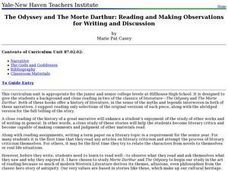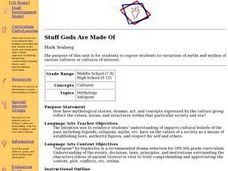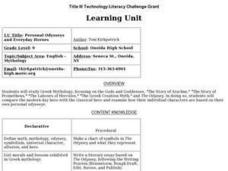Curated OER
The Odyssey and The Morte Darthur: Reading and Making Observations for Writing and Discussion
Learners read "The Odyssey" and "The Morte Darthur". In groups, they research the gods and goddesses of Greek mythology and the history of the places mentioned in the stories. Individually, they are to write a paper about a hero they...
Big Kid Science
Eclipse Classroom Activities: Cultural Significance Project
What better way to celebrate eclipses than across cultures? Explore myths of solar and lunar eclipses from ancient cultures like the Chinese, Ancient Greek, Mesoamerican, Incan, Egyptian, Ancient Babylonian, and Middle Eastern. Learners...
Curated OER
Myth Connections
Ninth graders present tales and myths in the oral tradition. They discuss the African method of telling a story where each member of the group tells a part of the story. They make up a composite hero and write a story that describes...
Curated OER
Stuff Gods Are Made Of
Students examine different myths of various cultures around the world. Using artwork, they discuss the artistic designs and develop hypothesize about their importance. They use the internet to research myths they are aware of and share...
Curated OER
GODS OF THUNDER: Myths and Mythical Characters
Students explore the myths and legends of the Ancient Greek and Romans in the ten lessons of this unit. Students compare and contrast the myths and the cultures that created them. Norse myths are included in this unit.
Curated OER
Personal Odysseys and Everyday Heroes
Ninth graders study Greek Mythology, focusing on Gods and Goddesses. They compare the modern day hero with the classical hero and examine how individual characters are based on their own personal odysseys.
Curated OER
Clash of the Titans Lesson Plans
The new movie "The Clash of the Titans" is a great way to learn about film making and Greek Mythology.
Curated OER
Reach for the Stars
Fifth graders select Greek Mythological characters to research. They gather research and keep notes on Inspiration. Students are to answer the question, "Which mythological character do you feel is the most worthy of being a...
Curated OER
Mythology in the ESL Classroom
Students study myths, mythological figures, and the ancient classics. They develop a sensitivity to the beliefs, values, attitudes, and views of man's development at that time. They illustrate the powers of each god discussed and...
Curated OER
When in Greece, Do as the Greeks Do
Students examine the contributions of ancient Greeks in this five lesson unit. The explorations reveal how Greece shaped our stories, our modern language, and our society. The study of the Greek myth forms the basis of this unit.
Curated OER
Ancient Greece: The Olympics and the Gods
Research Ancient Greece, the Olympic games, and Greek mythology. Young historians will research Ancient Greece and complete multiple activities about the history and culture. This is a unit of lessons.
Curated OER
Storytelling: Using the Arts to Enrich the Curriculum...
Students explore the art of storytelling and stories from various cultures. Students experience Japanese and Chinese culture as well as Greek mythology. Students create and present their own Greek mythology topic to the class.
Curated OER
Poseidon's Protectors to the Rescue
Students explore the concept of philanthropy. In this environmental stewardship lesson plan, students explore the Greek mythology story of Poseidon. Students write letters to Poseidon that address water pollution today and express how...
Newspaper in Education
The Iliad: A Young Reader Adventure
Is The Iliad part of your curriculum? Check out a resource that offers something for those new to teaching the classic and those with lots of experience using Homer's epic. Plot summaries, discussion questions, activities abound in...
Curated OER
Reading Comprehension 5: Level 8
Why is an atlas called an atlas? Because it is named for the Greek Titan, Atlas, of course. Young readers learn all about Atlas and atlases in a short passage used as the basis of a reading comprehension exercise. After responding to...
Reed Novel Studies
Ella Enchanted: Novel Study
Ella in Gail Carson Levine's Ella Enchanted receives the gift of obedience and must do what others tell her, but her strong personality struggles with this gift. Scholars review how Ella handles her fate by completing...
Curated OER
A Festival Day In Ancient Greece
Sixth graders present a Greek festival. In this Greek festival lesson, 6th graders experience many facets of an ancient Greek festival. Students in sixth grade present the Greek festival to second grade students.
Curated OER
How Tragic!
Tenth graders read and study, in-depth, a specific classical tragedy, in this case, Oedipus. They explore strategies from making meaning out of or interpreting texts, as well as strategies for determining how authors create meaning in...
Spark Notes
Antigone by Jean Anouilh: Study Guide - Mini Essays
In this online interactive literature learning exercise, students respond to 10 short answer and essay questions about Jean Anouih's Antigone. Students may check some of their answers online.
Curated OER
Dateline: Troy
Pupils read an abridged version of The Odyssey andl write a composition comparing Odysseus or the Iliad with Odysseus of The Odyssey. Students write a speech that King Priam would make in the attempt to persuade his son, Paris, to...
College of New Rochelle
Latin Worksheet: Horace, Ode 1.5
Take a look at Horace's "Ode 1.5" from Carmina in depth with an analysis learning exercise. Included on the first page is the original Latin version of the verses as well as a literal translation. Pupils respond to questions relating to...
Curated OER
"Building a Word Wall" Roots - The Foundation of Language
Students probe the impact of Greek and Latin on the English language in this ten lesson unit. Root words are analyzed for their origins and displayed on a word wall. Inventions are created using the words and placed in a class museum.
Curated OER
Ancient Greece
Students discover the world of ancient Greece. In this ancient Greece instructional activity, students compare and contrast the culture of Athens and Sparta. Students also compare the democracy in Athens with the democracy in the United...
American Museum of Natural History
What is Astronomy?
Go study the universe. Pupils learn seven aspects about astronomy and astronomers. They begin to learn about constellations; distance and motion between objects; gravity; the electromagnetic spectrum; dark matter and energy; and teams of...

























